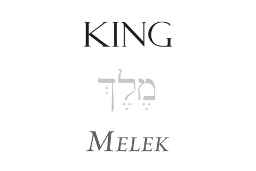From Praying the Names of God Week Seventeen, Day One
The Name
The Israelites believed that Yahweh was Melek, or King—not just over Israel but over every nation on earth. They understood that the temple in Jerusalem was the earthly symbol of God's heavenly throne, and they expected a coming Messiah who would one day save his people from their enemies, establishing his rule over the whole world.
The New Testament presents Jesus as the King of kings, whose perfect obedience ushered in the kingdom of heaven. For the last two thousand years, God's kingdom has continued to spread through every nation, tribe, people, and language, as men and women accept Christ's rule. When you pray to YahwehMelek, you are praying to the God who watches over the whole earth and who will one day come in glory to usher in an eternal kingdom of peace and righteousness.
Key Scripture
Endow the king with your justice, O God,
the royal son with your righteousness.
He will judge your people in righteousness,
your afflicted ones with justice.
The mountains will bring prosperity to the people,
the hills the fruit of righteousness. (Psalms 72)
***
Monday
GOD REVEALS HIS NAME
Endow the king with your justice, O God, the royal son with your righteousness. He will judge your people in righteousness, your afflicted ones with justice. The mountains will bring prosperity to the people, the hills the fruit of righteousness. He will defend the afflicted among the people and save the children of the needy; he will crush the oppressor. He will endure as long as the sun, as long as the moon, through all generations. He will be like rain falling on a mown field, like showers watering the earth. In his days the righteous will flourish; prosperity will abound till the moon is no more. He will rule from sea to sea and from the River to the ends of the earth... All kings will bow down to him and all nations will serve him. For he will deliver the needy who cry out, the afflicted who have no one to help. He will take pity on the weak and the needy and save the needy from death. He will rescue them from oppression and violence, for precious is their blood in his sight. Long may he live! (Psalm 72:1-8, 11-15)
Lord,my God and King, come and rule over us.Defend the afflicted. Look with mercy on the weak and the needy. Rescue us from oppression and violence and be our King forever.
Understanding the Name
Compared to surrounding nations, the Israelites were relatively late in adopting monarchy as a form of government. Instead, they thought of Yahweh as their King. Once the monarchy was established, it was understood that the king received his power from God and was therefore responsible for ruling according to God's laws.
David, Israel's second king, represented the ideal of how a king should rule. But most of the kings of Israel and Judah fell far short of the ideal, leading people away from God by forging ill-fated alliances with foreign powers and by sanctioning the worship of false gods. After years of living under the rule of these less-than-perfect kings, God's people longed for a Messiah—a descendant of David who would sit on Israel's throne, subdue its enemies, and then rule over the entire earth. Given these expectations, it is hardly surprising that even Jesus' disciples thought he would establish an earthly kingdom.
Studying the Name
- This psalm may have been a coronation prayer for one of the Davidic kings. Though it doesn't directly refer to God as the King, it does reflect the values of our heavenly King. Describe these.
- How would the world be different if today's rulers reflected the values expressed in this psalm?
- This psalm can also be read as a messianic psalm. How did Jesus fulfill this prayer?
- How have you experienced Jesus' rule in your own life? What difference has it made?
For more from Ann Spangler, please visit her blogspot on Christianity.com. And be sure to check out Ann's newest books on AnnSpangler.com. To hear more from Ann Spangler, sign up today at annspangler.substack.com.
Meet your spiritual ancestors as they really were: Less Than Perfect: Broken Men and Women of the Bible and What We Can Learn from Them.



